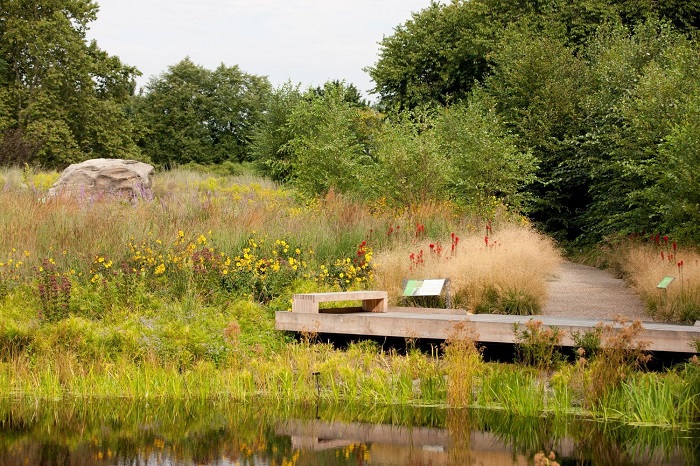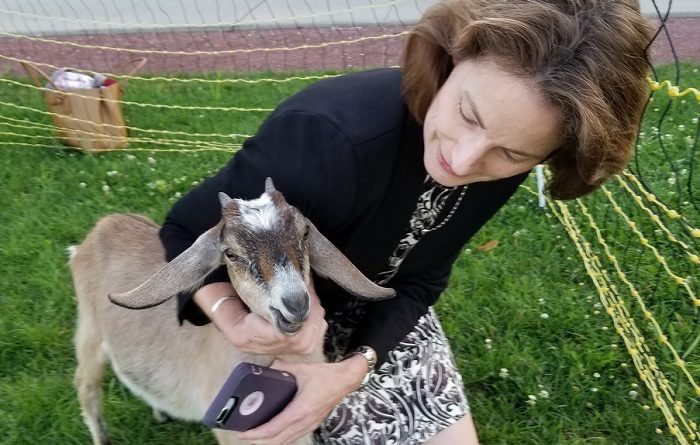Plants, Animals and Their Communities
Podcast: Play in new window | Download (Duration: 1:46:01 — 49.0MB)
Subscribe: Apple Podcasts | Spotify | Android | iHeartRadio | Podchaser | Email | TuneIn | RSS | More
The audacity of plant communities
(February 3, 2019) – You know we’re in dystopian times when one of the strategies to get people to a plant communities conference is to use phrases like “insect apocalypse” and “insect Armageddon”. Seriously, that’s one way the West Cook Wild Ones is drawing folks to The Naturally Beautiful Garden Conference 2019. To be fair, I note they also call it a “conference on how to design stunning home landscapes that inspire human happiness, provide critical habitat for wildlife and fight climate change.”
So, okay, it’s possible to view the half-empty glass as half-full, too. And if you’re like me, your gaze shifts warily from one glass to the other.
Conference speakers are garden designer Benjamin Vogt, who has been on this show, and landscape architect Claudia West, who hasn’t. We’ll get back to Vogt in a minute.
 Peggy and I have one degree of separation from West. In October we interviewed Thomas Rainer, her co-author on Planting in a Post-Wild World. Claudia and Thomas are, with Melissa Rainer, the owners of Phyto Studio, “a niche landscape architecture firm” in Arlington, Virginia. Given the success of the book, their concept of creating a “hybrid of ecology and horticulture” seems pretty mainstream lately. They have a couple of key philosophies.
Peggy and I have one degree of separation from West. In October we interviewed Thomas Rainer, her co-author on Planting in a Post-Wild World. Claudia and Thomas are, with Melissa Rainer, the owners of Phyto Studio, “a niche landscape architecture firm” in Arlington, Virginia. Given the success of the book, their concept of creating a “hybrid of ecology and horticulture” seems pretty mainstream lately. They have a couple of key philosophies.
- Bring together ecological planting and traditional horticulture
- Think about plants as groups of compatible species that interact with each other and the site
It seems simple, but as any veteran gardener will testify, it ain’t. So, next week, West will go first, and
explain, step by step, the art of arranging native plants – which are aesthetically and functionally very different from typical garden plants — using design principles learned from wild plant communities and archetypal landscapes.
She will be followed by Vogt, whose job is to
delve into philosophy, science, and psychology to make a case for re-imagining urban landscapes into a network of wildlife refuges. These wild-inspired spaces then become democratic spaces, in the tradition of Olmsted, where all species intermingle while creating awareness and activism for ecological health and social justice.
Vogt details that outlook in his book, A New Garden Ethic: Cultivating Defiant Compassion for an Uncertain Future. When he was on this show in 2017 to promote that work, I wrote this.
He takes issue with the “all of the above” strategy of plant selection. That’s the notion that it doesn’t matter whether a plant is a native or not, as long as the plant communities live in some sort of aesthetic “harmony.” In fact, he questions the very concept of aesthetics as a criterion for garden creation, noting that it is arrogant to impose human culture on nature:
Democracy is not giving all plants a fair shot in the garden. Democracy is respecting the revived ecosystem, the place of native plants and wild relationships, their shared history and mutualism, their reliance upon one another through evolutionary trial and error. When we step in and impose our ideals of democracy on a landscape, we disrupt and destroy the landscape, altering life processes that have worked long before we created human democracy; life processes that thrive, in many ways, on principles that oppose democracy.
So will there be a showdown between his philosophy and West’s? I guess you’ll have to show up on Saturday, February 16. at Triton College in River Grove, Illinois. Note that it is a half day and there is an unusual time of 12:00 to 5:00 p.m. By the way, there’s a 10% discount for the conference if you use the code MikeNowak2019 by Tuesday.
Livestock in your backyard
I love how Advocates for Urban Agriculture (AUA) promotes the 7th Annual Urban Livestock Expo on their Facebook page. The say they are “redefining what a ‘live’ event is.” Well, yeah! They will have live bees, goats, chickens, ducks, quail and a few other species on site. The full schedule is here. However, here’s a quick look at some of the workshops.
- Build Your Own Beehive (hands-on workshop)
- Incorporating Urban Backyard Chickens into a Permaculture Garden Design
- Goat Nutrition: The Foundation for Good Health
- Beginning Beekeeping
- Raising Chickens in Chicago from Chick to Soup Pot
- Backyard Goats 101
- Introduction to Keeping Ducks in the City
- Poultry First Aid & Common Diseases
- Chicken Coop Basics
- Native Bees & Pollinators in Your Backyard (hands-on workshop)
You can connect with local urban livestock groups and businesses for more information. That includes learning opportunities, support networks, sources of supplies, equipment, and more.
The event is Organized by AUA and Southside Occupational Academy. You can even take a tour of the school, at 7432 S. Hoyne Avenue in Chicago. The festivities are Saturday, February 9th, 11am-3pm.
In addition, Spanish interpretation will be provided. One of the presenters is an organization called Sustainable Sharing with Guatemala (SSG). This group works with indegenous Guatemalans on health, agriculture and environmental projects. At 1pm, visiting SSG Guatemalan partner Veronica Girón will present on Composting and Chickens as part of the Spanish track. That’s the first of three Chicago events featuring SSG.
On Monday, February 11, Veronica Girón will speak on Using Global Permaculture Methods to Enhance Local Stewardship. That event is from 7-8:30pm at Kilbourn Park, 3501 N. Kilbourn Park in Chicago. That talk outlines the work of SSG in Guatemala.
Finally, Girón appears at an SSG Special Event – Climate Resilience Panel on Saturday, February 15, 2-5pm. That will be at NeighborSpace, 445 N. Sacramental Boulevard, Suite 204 in Chicago. Veronica will share her personal field experience with Climate Resilience Permaculture practices that span borders. Other panel participants include Permaculture Institute Chicago, Citizens Greener Evanston, and Rain Ready.
Nick Lucas, Programs Manager for AUA, joins us this morning. In addition to the Livestock Expo, we will discuss other initiatives. Those include work with UIUC and Illinois Extension for free heavy metal soil screening across Chicago. There’s a rumor that we might even hear from Andrew Margenot, PhD this morning. He’s Assistant Professor of Soil Science at the University of Illinois. Peggy and I talked to him at the Good Food EXPO last year. Here’s a list of places in Chicago where you can get your soil screened for heavy metals this year.
The Urban Agriculture Ward Ambassador initiative is also a big part of AUA’s work. So we have a lot to cover. Strap in.
Can TerraCycle close the Loop?
Do you know who Tom Szaky is? Briefly, he’s a person who changing the world, one disposable item at a time. He was on our show eleven months ago. And then, last June, I ask him whether he had saved the planet yet. That’s when Peggy and I went to a Sustainability Summit in downtown Chicago and interviewed him on Facebook live. His answer was “No,” which was a disappointment to both of us.

However, I wouldn’t bet against him. Tom is the founder of a company called TerraCycle. He started the company in 2001 when he was a student at Princeton University. It’s mission is nothing less than Eliminating the Idea of Waste®. (Note that they’ve even trademarked that phrase.) In less than 20 years, TerraCycle has grown into the global leader in collecting and repurposing hard-to-recycle waste. It operates more than 20 countries, engaging more than 80 million people. Better still, it recycles billions of pieces of waste through various innovative platforms.
Their latest initiative might be the boldest of all–reusing packaging! Disappointed? Don’t be. It’s called Loop and TerraCyle is bringing in global brands with lots of fire power to make it happen. We’re talking about companies like Unilever, P&G, The Clorox Company, Nestle, PepsiCo, Coca Cola European Partners, Danone, and The Body Shop.
TerraCycle unveiled it at at the World Economic Forum in Davos, Switzerland in January. Here’s how Loop works, according to a TerraCycle press release.
SHOP: Consumers will go to the Loop website or Loop partner retailer’s websites and shop for trusted brands now redesigned to be packaging waste-free.
RECEIVE: Consumers receive their durable products in Loop’s exclusively designed state-of-the-art shipping tote that eliminates the need for single-use shipping materials like cardboard boxes.
ENJOY: Consumers experience elegance and convenience all while eliminating the idea of throw-away packaging waste.
WE PICK-UP: There is no need to clean and dispose of the package; as consumers finish their products, they place the empty package into one of their Loop Totes. Loop will pick-up directly from their home.
WE CLEAN: Loop’s team of scientists has developed custom cleaning technologies so that each product may be safely reused.
WE REFILL, RECYCLE OR REUSE: Loop promptly replenishes products as needed and returns the refilled shipping totes to the consumer. If there is recoverable product, it will be reused or recycled.
Will it work? That’s the billion dollar question. WasteDive.com talked to Szaky about whether waste companies will feel threatened by the program.
“I’d say at the very beginning, if I was working over at Republic or Waste Management or even Waste Connections (Waste Connections owns a quarter of our Canadian company) I think they wouldn’t even see this as a threat because it would seem super small compared to what is in the dumpster,” said Szaky.
“The real question is 10, 20, 30 years from now, if durable, reusable, repairable, that type of movement really hits scale — and I think Loop could be one of the vehicles that accomplish that — then you may see an effect on the loads, and unless you get involved in that, then you would see it competitively.”
Tom Szaky returns to the show this morning to tell us if Loop will save the world.

